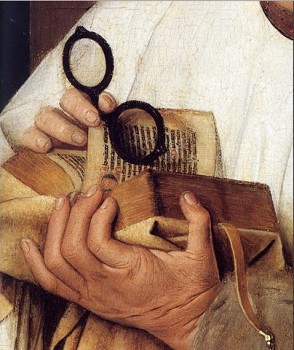Instant erudition, or, who are you kidding?
2 September 2014 | Articles, Letter from the Editors, Non-fiction

Time to read? Detail from Madonna with Canon van der Paele by Jan van Eyck (1439. The Groeninge Museum, Brugge). Wikipedia
In a recent ‘Saturday essay’ in the Helsingin Sanomat newspaper (9 August) journalist Oskari Onninen ponders the moral dilemma of pretending to be erudite. For example, who has the time to read books these days? ‘The Woolfs remain unread, Bergmans unwatched’, Onninen writes.
Our consumerist lifestyle forces us to follow the trends of ever-expanding, multiplying forms of entertainment. However, it is apparent that the need to know about culture in order to pass as a cultured, well-informed citizen still exists, to some extent at least.
According to Onninen, there is less and less time for unproductivity. ‘If one looks for measurable cost-benefit results from the reading of heavyweight fiction, the act of reading will certainly not always be worthwhile.’ Consuming art (reading books, going to art exhibitions, watching plays) requires time and effort, and how productive is that?
How many people have read all six of the autobiographical books by Karl Ove Knausgård (of contemporary fame) – or Dostoyevsky’s The Brothers Karamazov, for that matter? But, as Onninen points out, online access to virtual information makes superficial knowledge about anything easy to acquire. Then you are able to play the role of an intelligent connoisseur of culture. The title of Onninen’s essay is ‘I, a civilised hacker’.
This brings to mind a book I bought in London in 1976: Bluff Your Way in the Theatre (by Michael R. Turner). It was an entertaining little booklet providing the reader with useful hints on how to impress people with credible views about the Thespian art and contemporary theatre. To a drama literature student the idea seemed silly – but also worth checking out.
It’s unlikely that in those days even the faintest glimmer of the World Wide Web was present int he mind of Tim Berners-Lee, so the bluffing guide had to be a printed book. For the aspiring bluffer, or civilised hacker, there were other guides available – to art, wine and ballet, as well as to management and teaching, among others.
It turns out that bluffing is still going strong, though it has partly moved to the Internet. So if you’d like to bluff your way on beer, tennis, dictators, the Quantum universe, Twitter or Kate Bush, you can seek help. The printed books are still produced; Nick Yapp’s The Bluffer’s Guide to Poetry, for example, promises that after reading it you will ‘never again confuse an anapest with a distich, a panegyric with a polemical, or a haiku with someone clearing their throat.’
The concept of the Zeitgeist has often been attributed to the philosopher Hegel, but (as we easily learn from Wikipedia) he actually never used the term. According to him, though, ‘no man can surpass his own time, for the spirit of his time is also his own spirit’. The desire to appear ‘cultured’ among one’s peers has probably always existed; troglodytes probably gathered round the fire to discuss the quality of the brushwork in the next cave gallery. Being ‘a successful phoney’ might be a human characteristic of any Zeitgeist.
Onninen points out that reading is a particularly personal experience, ‘solitary quality time inside one’s own head’, coming to the conclusion that the utilitarian viewpoint is equivalent to the downfall of art.
In our Letter from the Editors in 2012 we discussed this, quoting the dramatist and theatre director Esa Leskinen who argues that ‘art is radically other than the field of sense and utility in which our everyday world is located. There is no sense in art. Art is no use.’
One can read about books, but reading books obliterates the fear of pretence; it may result in the real thing, cultural sophistication. What is more important though, is that reading at its best is an activity that cannot be measured in terms of ’achievement’: it is a joy of private interest.
No comments for this entry yet
